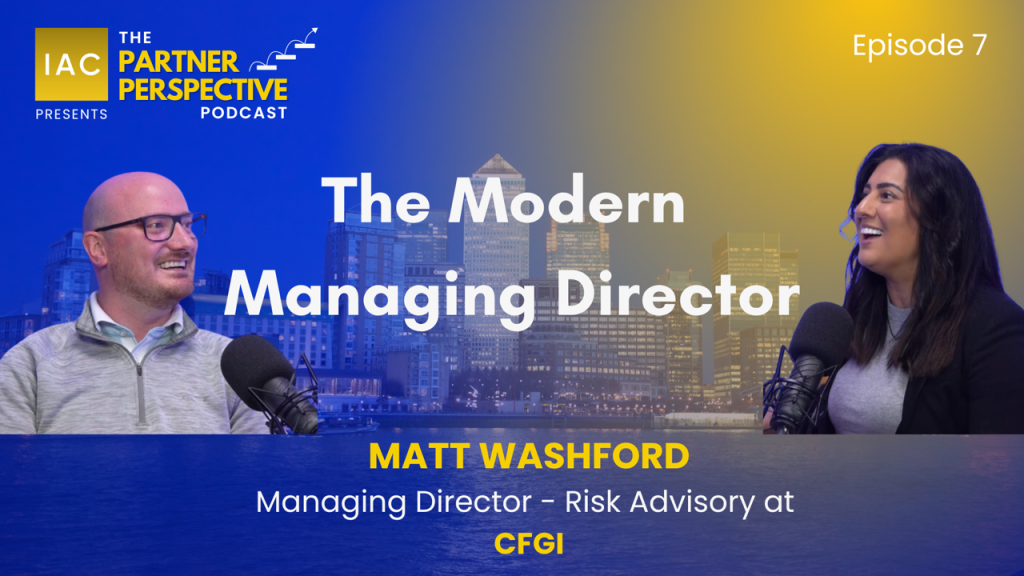In today’s corporate environment, managing diverse workforces requires understanding generational perspectives. Matt Washford, Managing Director at CFGI, shares insights from a recent interview on the Partners Perspective Podcast, discussing how to effectively engage with Gen Z employees through mutual learning, adaptation, and innovation.
Embracing Change: Understanding Gen Z
Having transitioned from a Big Four audit firm to CFGI, Matt has witnessed firsthand the varieties in workplace attitudes. In our conversation he discusses the stereotypes that can be applied to Gen Z about prioritising work-life balance at the expense of loyalty. Instead commends their focus on mental health and well-being.
Supporting this view, a Deloitte survey shows that 42% of Gen Z value work-life balance as a top priority, compared to only 29% of Baby Boomers.
For Matt, this generation’s emphasis on balance is less about avoiding hard work and more about creating a sustainable approach to their careers. He notes how this shift is reshaping the professional services industry, pushing firms to reconsider traditional models in favour of practices that support long-term well-being and productivity.
Learning from Gen Z: Adaptation and Integration
Initially, Matt’s own upbringing instilled an early work ethic in him after doing summer jobs from the age of 13. He understood the value of ‘hard work’, but he’s been able to learn from his juniors peers and, “Take a step back. We’re not achieving anything more at six o’clock on Thursday,” he recalls. This mindset shift helped him adopt a more balanced approach to work-life integration.
This perspective aligns with findings from the PwC Workforce Survey, which revealed that 77% of Gen Z professionals actively seek flexible work environments. These younger employees value mental health alongside productivity, challenging leaders like Matt to evolve. “We’re learning from them—these are lessons in valuing longevity over burnout,” he observes.
The Future Leaders: Adapting to New Perspectives

Matt emphasises that Gen Z will shape the future of professional services, making it critical for firms to adapt to their values. According to a report by Accenture, 67% of Gen Z employees would leave a company if its values, particularly around work-life balance and mental health, do not align with their own. “Retention is key,” Matt notes. “If we don’t adapt, we risk losing top talent.”
In addition to aligning values, younger employees also expect continuous feedback and transparent leadership. A Harvard Business Review study highlights that companies offering personal development programs see a 37% higher retention rate among Gen Z employees. Matt echoes this sentiment: “Mentorship and guidance resonate deeply with this generation. I love coaching people, bringing them along the journey, upskilling individuals in areas they may not have considered before.”
Bridging the Gap: A Shared Responsibility
Matt believes that bridging the generational divide is a shared responsibility. Leadership must foster a work culture that reflects Gen Z’s values, while Gen Z employees must recognise the demands of the professional services industry. The ability to find a middle ground, Matt suggests, will be key to ensuring long-term success for both employees and firms.
Conclusion: A Balanced Approach to Leadership
“This is a forward-thinking generation,”
Matt says, underscoring the importance of flexibility, open communication, and mutual understanding in bridging generational gaps. By blending traditional work ethics with modern expectations, firms can create environments that support both growth and innovation, ensuring success in an ever-evolving business landscape.
You can listen to the full Partner Perspective Podcast episode featuring Matt Washford:
If you need support or advice about hiring best practices in the professional services space, feel free to reach out to Sheena Dattani on LinkedIn.
